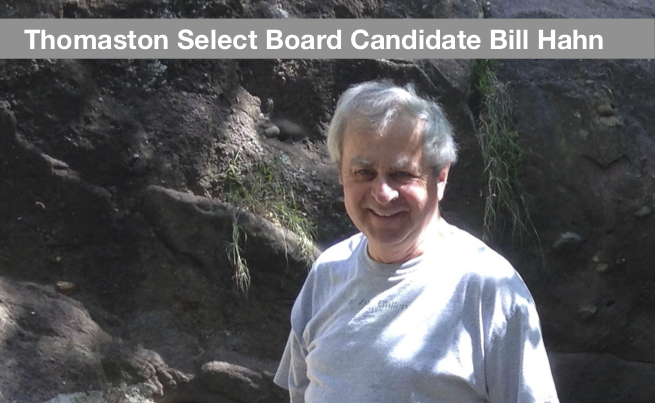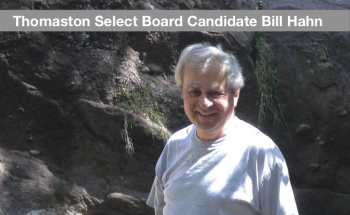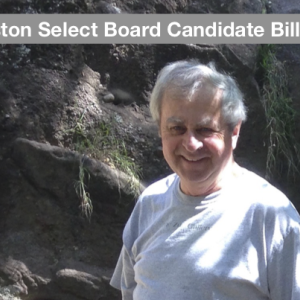On the issues: Thomaston Select Board Candidate Bill Hahn
I grew up in Thomaston, as did my father, as did his father; my great grandfather was from away, Waldoboro, and followed the railroad to Thomaston as a blacksmith. I attended local public schools, graduated Georges Valley, attended the University of Maine, and graduated with a degree in mechanical engineering. The first twenty-five years or so of my working career were spent in construction related endeavors. I then operated two motels in Camden and am now retired.
Through the years I have volunteered in many areas, Fourth of July, Watts Block Trustees, Watts Hall Community Players, various committees, and most anything else that needed to be done.
What are the three most pressing issues facing Thomaston today and how would you like to see them resolved.
Immediate issues are working through major changes in personnel, including our Town Manager, Public Works Director and EMS Director and rebuilding relationships. I believe next in line is to establish a long- term plan for the public safety departments. In the long-term the most important issue is developing and carrying out a plan for economic and community development. To this end I have helped to set a new Town committee to work aggressively toward this goal.
How will you protect the Thomaston taxpayer as you shape and govern a municipal budget and juggle various interest that request municipal funding through the year?
Ultimately, my goal is to assure that our town is a place whose residents want to, and can afford to, live. Services have to be provided at levels that make that possible.
Outlying communities are able to operate at lower costs as less services are provided. We have a Town Center, several miles of 25 mph streets, which require monitoring, maintenance and plowing, sidewalks, several elderly and lower income housing projects, spaces for social and public events, etc. The challenge is to maintain and protect our assets at a fair cost that is recognized and appreciated as such by our residents. As an example, walkability is a major attraction to many in our Town, that requires investment in several items noted.
On the other side of the equation, working to expand the tax base is necessary to help pay for services. Major efforts were made in this regard by previous boards in developing the East end; the Town has other resources that need to be developed and marketed to assist businesses. In the downtown area, the completion of the Route 1 project, and the redevelopment of the area behind the Union Block make our center more viable. The recent Block Party, organized by Andrew Josephs and Main Street Matters, brought many into the downtown for an afternoon of music, shopping and socializing; events like this will make our downtown more viable and ultimately, more valuable.
I attended the RSU 13 budget meeting the other night; the school budget represents close to 50% of our total budget. It is increasing 7% this year, which means that our budget increases 3½% with no increases in Town services. Reasons given are large numbers of special needs children, the care of which is underfunded by both the federal and state governments, and a funding formula which does not consider income levels and so penalizes areas with high property values and lower incomes. We need to lobby our legislators to correct this.
“Taxes are the price of civilization.” This quote by Oliver Wendall Holmes sums up the eternal dilemma. Our mission has to be to make the value of services provided by government commensurate with the cost.
What is your vision for the Watts Block?
I have been a participant in the ongoing operation of Watts Block for about 35 years. When we started, the second floor was essentially unusable for safety reasons and ADA was just being mandated; the Town corrected issues with new fire escape, sprinkler system, an elevator and various smaller improvements.
Each year the Hall is used for many public and private events; official use will be much reduced with a move to new quarters, but I believe the second floor should be retained for public use. Events there help support local businesses now, and I believe that benefit can be grown. Others see the value as well; we have received thirty thousand dollars in grants over the past year in support of energy related upgrades and providing air conditioning and updated heating in the auditorium. Public/private partnerships should be investigated; I am confident a plan can be developed that will provide ongoing public benefit at acceptable cost.
What is your opinion of the Municipal Facility Relocation proposal to the Lura Libby campus?
Our municipal offices and life safety departments have needed upgrading for a considerable length of time. The former school provides an option for solving the problem that should be adequate for many years. Further, the relocation was supported by a strong margin of voters. The question of EMS/Fire Department quarters going forward needs resolution; a principal economic benefit of utilizing the school is lost if these departments are not relocated there.
How do you see Thomaston positioned in the larger regional Midcoast economy?
Commercial redevelopment of the east end provides space for modern corporately owned properties; the character of the residential areas and the downtown is aided by the buffer created by the cement plant and the resulting lack of encroachment of larger businesses. Both areas can flourish. There is room for expansion in the east end commercial area, and with proper planning space can be made available to locate new manufacturing businesses.
Is Thomaston's zoning adequate enough to sustain economic vitality and quality of life?
Two years have been spent by dedicated citizens revising and updating the comprehensive plan with public input. The completed product will be the foundation of zoning decisions going forward. Zoning ordinances, by their nature, and the ever changing social landscape, are a work in progress, and must be continually revisited and updated.
Does Thomaston need its own police department or should the town contract with the Knox County Sheriff’s Office?
Our police department supports our community in many ways not normally associated with policing, and we benefit from that effort. I have the highest regard for Sheriff Carroll and believe wholeheartedly that his mission would be to provide excellent service. However, at this time I support retaining a force, sized to meet the Towns needs, that works in conjunction with the County to most effectively meet coverage requirements and eliminate duplication of efforts.
How should Thomaston resolve its mounting issues with its municipal ambulance service?
As in other service areas there is a shortage of qualified staff for our E.M.S. department, a condition that exists throughout the Midcoast area. We have recently hired a new director for this department, and I support working with her and our other department heads to find most productive ways of recruiting and utilizing personnel.
Free space for anything else you’d like voters to know about you and your positions on municipal issues!
I am particularly interested in supporting energy savings and utilizing alternative energy sources. To this end we have been investigating the possibility of a solar farm for Town accounts to be located on Town land near the treatment plant. The treatment plant has a system in place that saves around $ 2,000/year in electrical costs, and has since 2010; we are investigating financial approaches that will maximize returns while being environmentally beneficial and reducing our Town’s carbon footprint.
Event Date
Address
United States

























